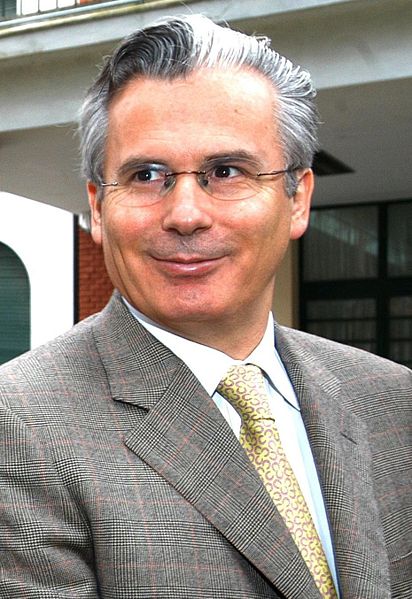
REPUTED RUSSIAN CRIME BOSSES DISMISSED MEDVEDEV AS PUTIN’S “PUPPET”
Publication: Eurasia Daily Monitor Volume: 5 Issue: 128
By:

While analysts and other observers continue to discuss Russia’s new ruling diarchy, in particular, the current relative balance of power between President Dmitry Medvedev and Prime Minister Vladimir Putin and how likely that balance of power will remain static, an unusual group of observers has reportedly weighed in on the issue, evincing a less-than-respectful attitude toward Medvedev.
The observers in question are the Russians among the 20 people arrested in Spain in mid-June who are alleged to belong to the St. Petersburg-based Tambov and Malyshev organized crime groups and are accused of criminal association, tax fraud and laundering proceeds from crimes that include contract killing and arms and drug trafficking. Along with several Spanish lawyers, those detained in what the Spanish authorities dubbed “Operation Troika” included suspected Russian crime bosses Gennady Petrov and Alexander Malyshev, who lent his name to the Malyshev group (although Malyshev reportedly changed his name to Aleksandr Lagnas Gonzalez after moving to Spain). According to Spanish police, the suspects have lived in luxury in Spain for the past 12 years; police reportedly confiscated about 200,000 euros ($307,000) and several luxury cars and froze bank accounts totaling 12 million euros ($18.4 million) from the suspects, who used bogus companies there to launder money from criminal activities in Russia and other former Soviet states (St. Petersburg Times, June 17; www.fontanka.ru, July 4).
Baltasar Garzon, the Spanish judge best known for issuing an international warrant in 1998 for the arrest of former Chilean president Augusto Pinochet over the alleged deaths and torture of Spanish citizens during his tenure, is heading the case against the alleged Russian mafia bosses. As the Spanish newspaper ABC reported on July 3, Garzon realized “how delicate this investigation is in view of its international context” and ordered that the results of the probe be kept secret so as to prevent leaks of information and protect the investigators. ABC described what it suggested might be the most ticklish aspect of the case: “The police gained access to conversations in which the detained ringleaders … named high-ranking representatives of the Russian authorities, not only from the government, but also from the military, as guarantors for the unimpeded realization of shady deals,” the newspaper wrote. “ABC’s sources explain that the mafiosi sometimes communicated directly with these high-ranking officials from their country and even mentioned them by name in order to assure their interlocutors that they would achieve their goals” (ABC, July 3).
The newspaper added that the most troubling thing learned from these apparently tapped telephone calls was that the suspected Russian criminal bosses were able to clinch such deals “without the slightest problem” and that such telephone conversations were “routine,” with “dozens” taking place daily. Information collected by the Spanish investigators over two years shows that the alleged Russian crime bosses had the opportunity “to bribe the highest echelons of the Russian authorities and shamelessly used that opportunity,” ABC wrote. “Ever since the Russian government in 2007 created state structures for the development of infrastructure and the merchant navy, the mafia groups uncovered in Spain have obtained lucrative contracts for fulfilling state orders, which they repeatedly referred to. They obtained these contracts without even having the specialists [needed] for the work that would be necessary to conclude agreements at such a level. And the military also did not escape their influence” (www.inopressa.ru, July 3).
In a follow-up article on July 4 about the suspected Russian mafia bosses arrested in Spain, ABC added some details about the state contracts they were allegedly able to obtain. “Only after receiving a state order–and they always received it when they wanted it, as is evident from the conversations in which the names of the main leaders of the country are mentioned–did they conclude agreements with contractors to carry out the work. This is precisely the way one of the mafia’s biggest contracts, for the construction of a multi-kilometer highway in Siberia, was obtained. There were also others: for the construction of a road in Finland and the Moscow-St. Petersburg highway [built] on expropriated land” (ABC, July 4; www.inopressa.ru, July 4).
Perhaps the most intriguing putative leak from the Spanish investigation involves Dmitry Medvedev and Vladimir Putin. While the reputed Russian crime bosses had links with high-ranking Russian officials, whom they cited as guarantors of their deals, Dmitry Medvedev was apparently not one of them. “He is not referred to as a guarantor and they do not call him a direct partner, although his name is sometimes mentioned, not too respectfully, one would say,” ABC wrote of the Russian president on July 4. “The mafiosi generally call him a puppet of Putin. In private conversations they positively assess the exchange of roles that has taken place in the Russian government [Medvedev becoming president and Putin becoming prime minister] and believe that this guarantees them [the crime bosses] further prosperity, say sources whom ABC’s journalists have contacted” (ABC, July 4).




